#Shmita
Explore tagged Tumblr posts
Text
Everytime I see those takes I think about Shmita.
I keep forgetting I wanted to ask indigenous ppl in other places if they have laws/rituals/traditions/etc. involving leaving the ground/letting it stay untouched?
(Shmita is a Jewish think. Every 7th year the land should be untouched, except for thing that might be necessary to keep it alive (like watering and stuff).
I'm too tired to fully explain it, but curious.
I read un North America there's the "3 sisters" thing, about planting 3 different plants in the same area.
I'm now curious about culture, agriculture, and religion.
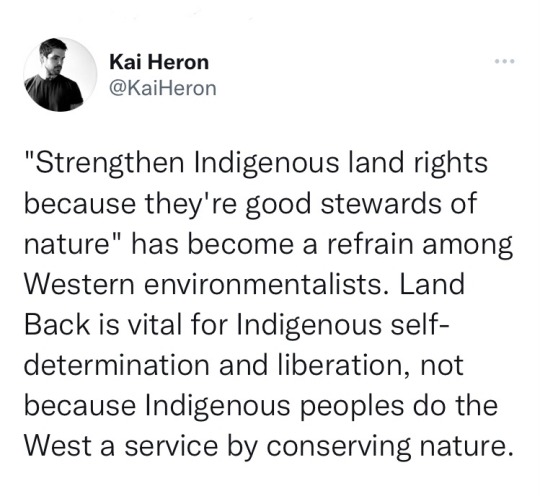
[Image description: a tweet by Twitter user “Kai Heron” (@KaiHeron) that says: "Strengthen Indigenous land rights because they're good stewards of nature" has become a refrain among Western environmentalists. Land Back is vital for Indigenous self-determination and liberation, not because Indigenous peoples do the West a service by conserving nature. /end ID]
Tweet link
#Shmita#3 sisters#agriculture#culture#religion#hindus#Hinduism#first nations#i don't know all the names#english is not my first language#but i'm curious
19K notes
·
View notes
Photo

'Fatter' Lee Jang-woo "Shmita Coming to an End in 2023"...Not for 10 Years
0 notes
Text


Rare face sighting because I have to show this off.
TRUST THE G-DDAMN PROCESS
#curly hair#2c3a hair#wavy curly#curly transition#coming up on almost SEVEN years y’all. my curls about to become a shmita
1 note
·
View note
Text
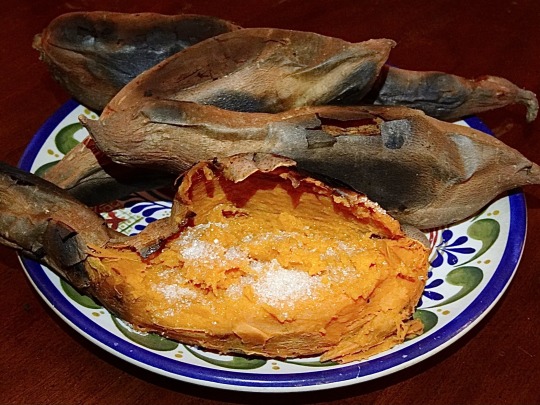
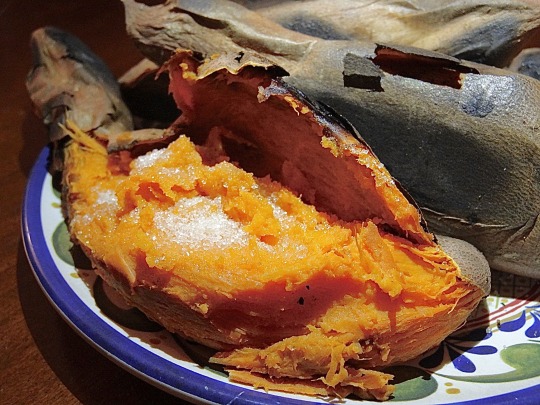
[ID: Sweet potatoes with black, charred skin on a decorative plate. One has been opened to show bright orange flesh, sprinkled with sugar. End ID]
بطاطا حلوة مشوية / Batata hiluwa mashwiyya (Roasted sweet potatoes)
Sweet potatoes are considered a traditional and nostalgic food in Palestine—a gift from the land, a seasonal delicacy, a potentially profitable crop, "red gold." Every fall and winter, as they are grilled in taboon ovens throughout Gaza, their smell fills the air.
This recipe uses a method of preparation common in rural Palestine, which applies direct heat to char the potatoes; the black, crackly skin is then peeled off, leaving tender, steaming, sweet flesh with a roasted aroma. The peeled sweet potato is eaten on its own, or sprinkled with sugar.
The recent history of sweet potatoes in Gaza is a microcosm of Israel's economic control of the region during that time. Though they grow well in Gaza's soil, they are a risky commitment for its farmers, as the seeds or seedlings must be imported from Israel at considerable expense (about 40 shekels, or $10, per plantlet), and they need to be weeded every day and irrigated every other day. Water for irrigation is scarce in Gaza, as Israel drains and contaminates much of the supply.
Nevertheless, the crop would be a profitable one if Gazan farmers were allowed to export it. In the shmita year of 2014, for the first time since the Israeli military's deadly 51-day invasion two months prior, restrictions briefly eased to allow Gazans to export some agricultural products to Europe; the first shipment contained 30 tons of sweet potatoes. However, an estimated 90% of the sweet potato crop was at that time unsuitable for export, having been damaged by Israeli shrapnel. The Gazan Ministry of Agriculture estimated that damages of this kind cost the agricultural sector about 550 million USD during this year.
Gazan economist Maher al-Taba’a holds that Israel temporarily allowing export of a token amount of sweet potatoes “is nothing more than media propaganda which is meant to confuse international audiences" by giving the impression that the siege on Gaza was looser than it had been before the 2014 ceasefire agreement; meanwhile, the number of allowed exports had actually decreased since before the invasion occurred. Gazan farmers, in fact, were not even allowed to export produce to Palestinians in the West Bank until 2017.
The next shmita year (an agricultural sabbath during which ultra-Orthodox Jews allow their fields to lie fallow) began in September of 2021, around the same time as the beginning of the sweet potato harvest. In anticipation of the shmita year, and in keeping with the trickle of Gazan exports that had been allowed into Israel in the intervening years, many farmers had planted more than they otherwise would have. But Israel delayed accepting the imports, leading many farmers to throw away rotting produce, or to sell their produce in the local market for far lower prices than they had been expecting.
Israel's habit of closing off Gaza's exports arbitrarily and without notice recurred during the harvest season of 2022. When Israeli former MK Yaakov Litzman called on Minister of Agriculture and Rural Development Oded Forer to import sweet potatoes from Gaza due to a shortage of the produce in Israel, Forer refused, citing Israeli soldiers whom Palestinian resistance fighters had taken hostage as rationale for his decision. Other officials were surprised at the linking of an agricultural matter to a political one.
Farmers had no choice but to enter the harvest season hoping that the decision would be reversed and that their time, labor, money, and scarce water resources would not go to waste. With these last-minute decisions that cause Gazan farmers to be unable to fulfill their contracts, Israel damages the future viability of Gazan exports to European markets.
Support Palestinian resistance by calling Elbit System’s (Israel’s primary weapons manufacturer) landlord and donating to Palestine Action’s bail fund.
Equipment:
A fire, wood-burning oven, gas stove, or broiler
A baking sheet
Ingredients:
Sweet potatoes. Choose a variety with red or orange skin and orange flesh, such as garnet or jewel.
Sugar, cinnamon, date syrup, or tahina, to serve.
Instructions:
1. Wash sweet potatoes. Place them at the bottom of a taboon oven, or on a baking sheet or griddle laid over a cooking fire or gas burner. You may also place them on a baking sheet or cast-iron pan inside an oven with a broiler setting.
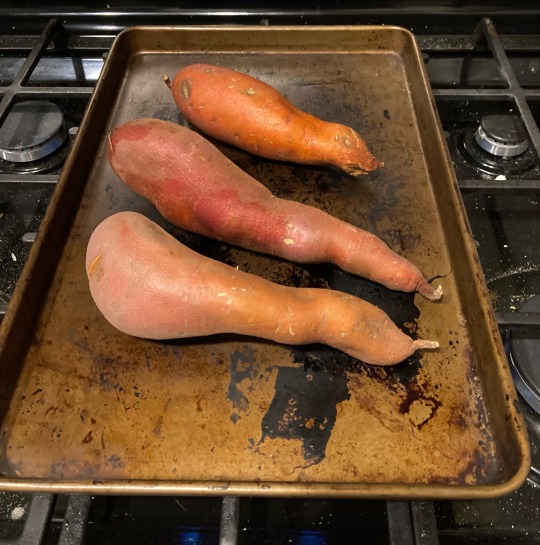
2. Turn the gas burner on medium-high, or the broiler on low. Heat the sweet potatoes, occasionally rotating them, until their skin is blistered and blackened in multiple places and they are tender all the way through.
3. Remove potatoes and allow them to cool slightly. Slice each potato open lengthwise, or peel away its skin, and eat the interior.
Roasted sweet potatoes may be eaten on their own, or sprinkled with sugar or cinnamon-sugar, or drizzled with date syrup, tahina, chocolate sauce, etc.
367 notes
·
View notes
Text
Following the post earlier this week from @dropoutdottv , I feel it necessary to speak out against their statement and add my voice to the many other Jewish fans that have raised issue with them. Their recent stance that has come out about "platforming zionists" is extremely antisemitic and problematic. As has been mentioned a few times relating to this post, the term ‘Zionist’ is very often used as a slur for Israelis and/or Jews. Responding to accusations of “platforming zionists” with what essentially boils down to “we checked with every Jew to see what their political stance is on a country they may or may not have any connection to, and made sure that they were a Good JewTM who agrees with us” is…troubling to say the least. According to a survey done in June by the AJC, 85% of American Jews feel that it’s important to support Israel in the aftermath of October 7th, not to mention Jews worldwide. To claim that they are “granting grace” for people to grow and educate themselves, heavily implying that Zionism is an outdated belief that Jews should discard is, again, hugely problematic. Additionally, as a streaming platform, coming out and making a claim of genocide is outrageous, especially given the lack of evidence and support of this claim. On the other hand, Hamas and other Palestinian authorities have been open and forthright about their genocidal values, which has gone completely unmentioned. Also unmentioned is every attack Hamas, Hebollah, and Iran have made against Israel, which, if not for the Iron Dome and other protective systems, would have decimated Israeli civilians (as well as the attack which started this war in the first place, which did target civilians, many of whom are still held hostage by Hamas). The truth is, as a comedy show, trying to get involved in or make grandiose statements on any international politics is beyond absurd - a fact dropout seems to understand given its lack of commentary on any other international conflict or affair. This is an obviously complex issue and giving full support to one side of the conflict while outright saying that they would never host Zionists on the platform is just plain and simple antisemitism. Making the situation worse, the wording of the post is highly inflammatory and exacerbates the conflict and current situation by encouraging those who initiated the conflict in the first place to continue trying to exterminate all Zionists rather than lay down their arms and negotiate for peace. Not only is Dropout encouraging this, they are actively supporting organizations that have ties to terrorist groups, such as the UNRWA, which has had multiple members investigated for actively participating in the October 7th massacre, as well as for keeping civilian hostages in their homes. And to tie it all up, there’s the claim of occupation. This is a blatant denial of history, as Jews, historically, have our roots tied to the ancient kingdom of Judea, located in modern day Israel. The Jewish calendar, as well as Jewish law, revolves around the farming seasons of Israel. So much so, that there are some laws that one is only allowed to keep within Israel (see shmita). To now cry “occupation” is to deny Jews the right to live peacefully in a land that we have always had a presence in, even throughout the long years of the Diaspora.
So dropout, I ask you to reconsider your statement. Please, listen to what your Jewish fanbase is telling you. We just need you to listen.
34 notes
·
View notes
Text
Ppl saying "it's a Jewish tradition to keep going" =
Ppl saying "it's a black tradition to work in Fields"
(Guess what wasn't legal for those groups?)
Also, The Wandering Jew is an antisemic trope.
So much of Judaism and Jewish laws and culture is based on land and agriculture. We have this complicated calender and schedule about trees and land, from Shmita (1/7) to Ibur Shana (7/19) to Yovel (1/50) and 3 main holidays related to harvest, gather, Bikurim; we celebrate the first blooming trees of Israel - even ppl who's never been there, who never met anyone who's been there, celebrate it.
We have different prayers depends on the season of the year, and we start praying for rain 40 days after our main holidays - to ensure visitors would make it home safely. We know that 2,000 years ago ppl prayed that there won't be floods in the Sharon area, so "The Sharon's ppl homes wouldn't become their graves".
"ועל אנשי השרון היו מתפללים, שלא יהיו בתיהם קברותיהם"
(not an accurate cite)
I'm just.
Sometimes I really can't understand.
(And part of me wonder: why do I even bother?)
#jumblr#history#jewish history#jewish holidays#thoughts#antisemism#antisemitism#Judaism#agriculture#agriculture culture
20 notes
·
View notes
Note
Follow up
טניה is a good one
Also אמא
עור ברווז is a classic tho
Maybe you should start with עור ברווז
Help למה האסק שלי נראה פואטי
third one's the charm
Goosebumps
youtube
[Lidoy] How she walks on the beach between the bags She got one tooth of teal and clean ears Heats up the sun, she burns her a bit Like Ozeri she is beloved by the created beings
Another wasted winter, I am unconcentrated The hair is shining, she shampooed with Ritzpaz (a brand of floor cleaning matirial) She drinks a cocktail, I'm drinking a Mitz Paz (a brand of fruit juice) A demon like Taz, and it gives me goosebu, goosebumps
Goosebumps, goosebumps And how she gives me Goosebumps Goosebumps, Goosebumps And how she gives me goosebumps
A bright morning, the month of Shvat, we got in the water (winter month) There are fruits, there's no (can\bear) opener, we returned home There is an opener, fuck it's hot, and she is at the near sunshade Sees her, turning on suddenly, and she is like a portable charger
Touch touch touch touch (also the sound the goose makes) Man don't touch her - touch her In case you'd be hurt rt rt A black eye in the eyebrow-ow, because you got in trouble with Asthma How I got caught up in her charms Calves, the waves, circles, circles How we stay with her A year of Shmita, like a matza with chocolate in a wheat farm
So if you feel like dancing Then my heart is in top pace And if you're from Ashdod Then I'm from Gan Shorek
Another wasted winter, I am unconcentrated I asked "shall we fuel?" she said we'll go to the Paz (1. fueling means drinking alchohol in the hebrew slang. 2. a gas station brand) She hustled my heart like Tshuva did with the gas (Israeli Oligarch) Drinking carbonated, and it gives me goosebu, goosebumps
Goosebumps, goosebumps And how she gives me Goosebumps Goosebumps, goosebumps I swear by the Baba-Sali, goosebumps
(she) loves ptitim, solves a questionair, drives to the sea and parks in the Yarkon Drinks a Capri Sun with a cinnamon stick, she bought with a friend an Ulpana in the north (religious girl school) Peels off, washes, eats a jar. She does rounds with the middle east's basin How she does it right
She's got the body of Eti Ankri (what?) my heart she creams She is gluten intolerant, no it isn't possible How ama-amazing she is
So if you feel like dancing Take the fins off And if you wanna swim\squeeze I have fresh oranges
Goosebumps, goosebumps And how she gives me Goosebumps Goosebumps, Goosebumps And how she gives me goosebumps Goosebumps, goosebumps And how she gives me Goosebumps Goosebumps, goosebumps I swear by the Baba-Sali, goosebumps
Goosebumps, Goosebumps And how she gives me goosebumps
#david's askbox#טאמבלר ישראלי#טמבלר ישראלי#ישראל#ישראלבלר#ישראלים#עם ישראל חי#עברית#חרבות ברזל#ישר#ישראבלר#ישרבלר#jewish history#jewish#jewblr#jewish tumblr#jumblr#Judaism#music writing#new music#music video#songs#tunes#musician#musica#music#david-translation#song of the day
7 notes
·
View notes
Text

This Israeli farmer is lighting the menorah at the tomb of King David. 👑🕎
In Jewish tradition we learn that when you want to ask someone for a blessing, you shouldn’t go to a righteous person or a rabbi, RATHER, you should go to a farmer that keeps Shmita. 🧑🌾🌾
But why❓🤔
NOTE: Shmita is the Jewish law of observance to not farm or tend to the land of Israel in each cycle of 7 years. The numerical value of 7 in Judaism is nature, due to the world being created in 7 days. 🌎 It is also on the 7th day that G-d rested and set a time for the entire world to rest as well (Shabbat).💤 So too, the land of Israel is meant to rest as well to allow it to rejuvenate. 🌱
However, the farmers of Israel know that if they are to keep shmita, that they would not make any profits that year and ALSO for the year to come. 🤯
This causes farmers to rescind their power and relinquish it, to put their complete trust in G-d.
The number 8 in Judaism represents miracles because it “one ups” nature. ⬆️ The 8 nights of Chanukah reaffirm this, since the essence of Chanukah is all about miracles. ✨
So too with the farmers that keep shmita. They know that only the year after shmita, year 8, will they start to MAYBE reap the fruits of their labor. 🍇
This highlights their fervent belief in miracles.
So… When one receives a blessing from a farmer, they receive it from an individual that lives and breathes miracles. 💨
How appropriate is it then that a farmer should light the public menorah at King David’s tomb? 👑
The farmers of Israel are now praying for miracles. We encourage you to help them by contributing to save a farm. 🇮🇱
The agricultural ecosystem is in their hands and due to the impact of the war, their farms are crumbling.
Israel’s economy depends on these farmers and the farmers depend on donations to help them get back on their feet. 🧑🌾
saveafarm
40 notes
·
View notes
Text
i'm trying to read the parsha and i really want to learn more about how shmita & yovel actually operate in both ancient and modern israel but idk how to find this out
9 notes
·
View notes
Text
So, as I have stated before, I have been working on creating my own Calendar (because why not)
So, because of that, I'm making it everyone's problem
The Current Era began on March 21, 1821. I chose this date for a number of reasons
First, the First Vision occured in 1820. This likely occured on the 26th of March (which was after the Spring Equinox that year)
Additionally, I found the Shmita/Jubilee Cycle in the Old Testament to be helpful for the Intercalation (I'll explain this more later). Jubilee Years were times of Celebration, when Debts were released, so I made 1820 a Jubilee Year. It also fits with occurrences in the Salt Lake Valley, specifically the Plague of Grasshoppers in 1855, which is a Shmita year with these calculations
So, how is it set up:
I blatantly stole from the Greyhawk Calendar. Specifically, there are 4 Seasons comprised of 13 weeks (a Weeklong Seasonal Festival, followed by 3 28-day months)
But, there are adaptations. There are 3 Types of Different Year: Shmita, Jubilee, Completion.
There are 7 Years in a Shmita, ith the Seventh being the Leap Year
There are 7 Shmita Cycles in a Jubilee Cycle, making 49 Years. The Jubilee is the 50th Year
There are 7 Jubilee Cycles in a Correction Cycle. The 7th Jubilee Year is the Completion Year. It is in there to remove a week, aligning the Calendar to the actual Solar Cycle (which would make the Calendar a week early every 350 Years)
The Shmita Year is the Basic Leap Year. There is an additional Weeklong Festival added to Needfest (the Winter Solstice Festival). This is also how the Correction Cycle works
The Jubilee Year has 2 Additional Weeks. One is added to Needfest (like in a Shmita & Correction Year), while the other is added to Richfest (the Summer Solstice Festival)
The Months are:
Growfest (7 Day)- Spring Festival
Planting (28 Days)
Flocktime (28 Days)
Wealsun (28 Days)
Richfest (7 in Most, 14 in Jubilee)- Summer Festival
Reaping (28 Days)
Goodmonth (28 Days)
Harvester (28 Days)
Gainfest (7 Days)- Autumn Festival
Patchwall (28 Days)
Ready'Reat (28 Days)
Sunsebb (28 Days)
Needfest (7 Days, 14 in Shmita, Jubilee, and Correction)
Fireseek (28 Days)
Readying (28 Days)
Coldeven (28 Days)
(I'm considering changing the names to my Conlang, but I only have "Bethola" for Goodmonth)
This is only scratching the surface. I can talk so much more about it. I can get into the specifics of the Months & the Days (such as the Day being divided into 8 3-hour Chunks), but this is long enough
#calendar#364 day calendar#new calendar#i was bored ok#calendar creation#triarchy of zomar#zomar#why not#i'm very weird#calendar reform#reform the calendar
2 notes
·
View notes
Text
Another example is the shmita year (letting fields lay fallow one in every seven years).
Cereals drain nitrogen from soil, and legumes replenish them, and people in the Middle East had been rotating planting crops in a field between the two since at least 6000 bce.
However, leaving fields fallow for a time also helps them replenish, as later systems such as the European three-field system show (x)
Biblical law often works in broad strokes, so the suggestion of “don’t farm a field once every 7 years” became a national ban on farming once every 7 years, possibly also because the rabbis weren’t farmers.
listen to me very very closely: the biblical prohibition against mixing linen and wool is the most SENSIBLE THING IN THE WORLD, do not write it off as silly, unreasonable, or unnecessary. g-d didn’t tell us not to mix linen and wool for no reason, g-d told us not to mix linen and wool together because mixing them is an affront to textiles
19K notes
·
View notes
Text
caller: I have a question about shmita (gap year for harvests to let the fields rest). Is it the same year for everyone, or can I pick my own year?
me: it's. on a set cycle, so it's the same for everyone
her: ok. and do i have to let all my fields rest, or just part of them?
me: i think all of them?
her: huh. i think that's insane but ok
me, internally: do you have fields?????
1 note
·
View note
Text
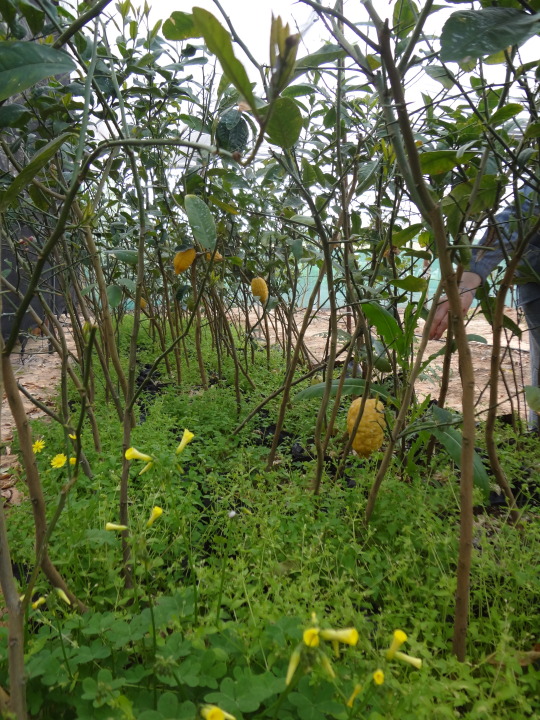
Shmita in Kefar Chabad, Etrog orchard left untended.
0 notes
Text
So, I promised, and I shall deliver
Today on my calendar is 1 Growfest, 205AV. What better time to share it
Calendar
Months
(Can be seen on a spectrum of Inspired By to Blatantly taken from the Greyhawk Calendar made by Gary Gygax, with some adaptations
Spring:
-Growfest (7 Day)
-Planting (28 Days)
-Flocktime (28 Days) (14-16 is Semyera, or Summer-Seed)
-Wealsun (28 Days)
Summer:
-Richfest (7 Day, 14 in Jubilee & Correction Years)
-Reaping (28 Days)
-Goodmonth (28 Days) (14-16 is Dimming)
-Harvester (28 Days)
Autumn:
-Gainfest (7 Day)
-Patchwall (28 Days)
-Ready'Reat (28 Days) (14-16 is Geyera, or Winter-Seed)
-Sunsebb (28 Days)
Winter:
-Needfest (7 Day, 14 in Shmita & Jubilee Years)
-Fireseek (28 Days)
-Readying (28 Days) (14-16 is Brightening)
-Coldeven (28 Days)
Weeks
The Weeks have 7 Days, each Day beginning at Sunset (like in the Celtic Calendar, or the Jewish Calendar)
The Days are Ehshin (Sunday), Nishin (Monday), Zeshin (Tuesday), Tehshin (Wednesday), Vehshin (Thursday), Psishin (Friday), and Bethshin (Saturday)
Months always begin on Tehshin
Years
In the Months Section, you noticed that the Seasonal Festivals are sometimes a week, and sometimes two. This is because a 364 Day Calendar doesn't align with the Solar Calendar. So, because of this, I included this feature
-Shmita Year: A Seven Year Cycle. Based on the Biblical Shmita Year, where the fields were left Fallow. Used to help calculate the starting year of the Calendar (based on Rest Years in Pioneer Era Utah). An additional week in Needfest
-Jubilee Years: A 50-Year Cycle (7 Shmitas, and an additional Year). Based on the Biblical Jubilee Year, acting as a Double Shmita, while also releasing Debts. Also based on Jubilee Years celebrated in Utah, which follow the same principals. An additional week in Richfest & Needfest
-Correction Year: Happens every 350 Years (7 Jubilees). Created by me, to align with the Solar Calendar. An additional week in Richfest
The Current Era began on March 21, 1821 (and the last Jubilee Year, year 200, began on March 11, 2020)
If you want me to expand the Calendar (including Celebrations, Associations, ECT), just let me onow
#triarchy of zomar#zomar#reform the calendar#364 day calendar#calendar creation#calendar reform#calendar#calend#i was bored#i was bored ok
0 notes
Text
During shmita, the land is left to lie fallow and all agricultural activity, including plowing, planting, pruning and harvesting, is forbidden by halakha. […] All debts, except those of foreigners, were to be remitted.
I’m gonna file bankruptcy every 10 years to cleanse the palate. A beautiful economical reset button.
115 notes
·
View notes